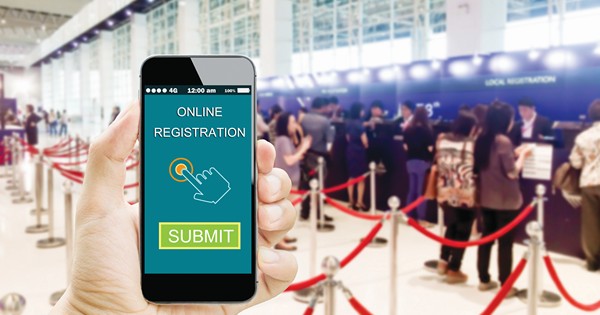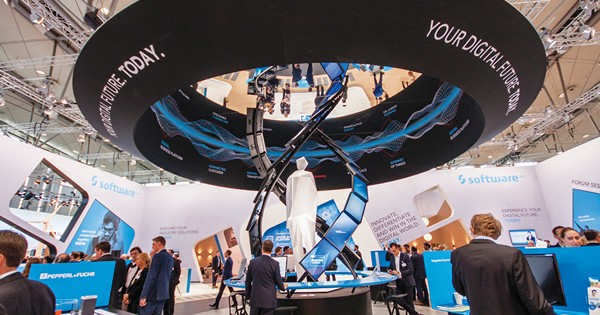THE DATA-DRIVEN ERA

The surge in data analytics is transforming India’s events and exhibitions sector. Data has evolved into a potent growth catalyst as internet usage grows, emphasizing data-driven decision-making and expanding market value. Event organizers are steering their strategies with data as the compass, a transformation that promises to redefine the future of the events and exhibitions industry.
Event organizers are increasingly relying on data-driven strategies to make informed choices, enhance attendee experiences, and maximize the return on investment. This method relies on data collection, analysis, and interpretation to make strategic decisions and empowers event organizers to move beyond gut feelings and assumptions, utilizing actual information to understand attendee preferences, behavior patterns, and engagement levels.
Data’s Role in Event Evolution
The potential of data in events is transformative. It impacts key areas such as targeted marketing and personalization, event logistics optimization, attendee engagement enhancement, real-time monitoring and feedback, and post-event evaluation and insights. To harness the full power of data, event organizers must adopt a structured approach, defining objectives, collecting relevant data, organizing, and analyzing it, making data-driven decisions, and continuously evaluating and adapting. In conclusion, data has evolved into a strategic asset for event organizers in the digital age, ultimately leading to greater success and innovation in the events and exhibition sector.
Navigating the Data Revolution
Data has become the key to event planning, allowing event organizers to improve their events. Employing a wide array of data collection methods, organizers empower themselves to make informed decisions and enhance the overall event experience. To unlock the full potential of data, event organizers should: develop a clear plan for data collection; choose appropriate tools for data collection; cultivate support from their team regarding the significance of data collection; and maintain transparency with attendees regarding data collection and its purpose.
Key channels for data collection encompass
Event Registration Data: Gathering attendee information during the registration process, capturing essential details like names, email addresses, job titles, and affiliations.
Social Media Data: Social Media platforms such as LinkedIn can help organizers learn about possible attendees’ interests, conversations, and followers.
Survey Data: Organizers can use surveys to ask attendees and exhibitors about their event experience, what they liked and disliked, and what they could do better.
Event Ticketing Data: Collecting data as attendees purchase tickets, including ticket types, event date, time, and seat assignments.
Event Lead Capture Data: Utilizing badge scanning at lead capture stations to obtain attendee particulars, such as names, email addresses, job titles, and organizational affiliations.
Event Analytics Data: Harnessing event analytics software to monitor attendee behavior, session attendance, interactions with exhibitors, and engagement with event content.
Effective data analysis entails the organization of data into accessible formats, such as spreadsheets, customer relationship management (CRM) systems, or dedicated event management software platforms. Through adherence to these principles, event organizers can tap into the transformative power of data, elevating their events and ensuring greater success.

The events and exhibitions industry is experiencing a significant shift towards data-driven decision-making, and this transformation is proving to be instrumental in enhancing the quality of events. Data is no longer just an asset but a necessity for event organizers to make informed decisions spanning marketing, venue selection, program planning, and more. Event organizers employ data in various ways, including Registration Data for popular topics and speakers; Social Media Data for attendee engagement and evaluating the effectiveness of marketing campaigns; Lead Capture Data for lead nurturing through the sales funnel, thus enhancing sales and customer value; and Survey Data for attendee feedback.
For event organizers venturing into data-driven decision-making, it is crucial to define key questions, collect the right data, conduct data analysis to draw actionable insights, and use informed decision-making to guide decisions and drive success in the industry. While data-driven decision-making may present challenges, the rewards in terms of improved events and competitive advantage make it a worthwhile endeavor for event organizers.
Harnessing the Power of Data
Event organizers and exhibitors, armed with the right tools and strategies, are capitalizing on data collection, analysis, and application to make informed decisions, boost event attendance, and enhance marketing campaigns.
A look at a few concrete ways in which data is driving growth:
Precise Audience Targeting: Event organizers utilize data to pinpoint their ideal attendees by analyzing demographics, interests, and past behavior. This targeted approach results in increased event attendance and higher engagement.

Enhanced Lead Generation and Sales: Exhibitors use data to optimize lead generation and sales. By tracking lead engagement and the effectiveness of marketing channels, they can efficiently nurture leads through the sales funnel.
ROI Measurement: Data empowers event organizers and exhibitors to measure the ROI of their events and marketing campaigns. This data-driven approach justifies expenditures and aids in making informed decisions for future events and campaigns.
This data-driven strategy can be supported by Event Management, Marketing Automation, Data Analytics, and Customer Relationship Management (CRM) Software. These methods help event organizers and exhibitors maximize data value, develop, and stay competitive in the ever-changing event industry.
Data & Analytics Fueling India’s Event Ecosystem
India’s events and exhibitions industry is undergoing a transformative evolution, driven by the exponential growth of data and the power of analytics. Internet users have nearly doubled from 20 percent in 2018 to 41 percent in 2019 and are expected to reach over 900 million by 2025, enabling this data revolution.
The Indian events and exhibitions market is burgeoning, expected to surge from US$ 4.75 billion in 2023 to US$ 8.71 billion by 2028, driven by Government initiatives and the country’s rapid economic growth. With India’s improving ease of doing business rank, events and exhibitions are becoming catalysts for the economy, opening up unparalleled opportunities for enterprises.
The exhibition industry in India is poised for continued growth. As data analytics propels businesses and the Government into a digital future, the events and exhibitions sector are leveraging data-driven insights to provide enhanced and efficient experiences, marking a promising chapter in India’s journey of progress and transformation.
The Indian events and exhibitions market is expected to grow from US$ 4.75 billion in 2023 to US$ 8.71 billion by 2028, driven by Government initiatives and the country’s rapid economic growth. Data analytics is seen as a catalyst for providing enhanced and efficient event experiences in the industry.
For event organizers venturing into data-driven decision-making, it is crucial to define key questions, collect the right data, conduct data analysis to draw actionable insights, and use informed decision-making to guide decisions and drive success in the industry.
To unlock the full potential of data, event organizers should develop a clear plan for data collection; choose appropriate tools for data collection; cultivate support from their team regarding the significance of data collection; and maintain transparency with attendees regarding data collection and its purpose.
